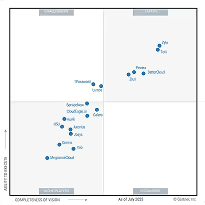HIPAA Compliance Checklist for 2025

Procurement is entering a new era, driven by the rise of AI. Traditional methods can’t keep up with today’s supply chain disruptions, regulatory demands, and market volatility.
According to a Gartner report, 78% of global enterprises have either implemented or are actively scaling AI procurement tools in 2025.
An April 2025 study by Ardent Partners, based on responses from nearly 400 procurement leaders, found that 62% believe the impact of AI on procurement in the next 2–3 years will be “transformational” or “significant.” AI adoption is already driving results, with some enterprises reporting procurement cycles up to 70% faster thanks to AI automation and insights.
TL;DR
- AI is transforming procurement by automating tasks, optimizing vendor selection, and speeding up sourcing cycles, with AI platforms achieving up to 90% straight-through processing.
- AI platforms cut procurement cycle times by up to 70% and reduce costs by 5-12% through automation and intelligent insights on supplier risks, spend, and contracts.
- AI tools help procurement teams enhance efficiency by automating repetitive tasks like invoice matching, purchase order processing, and vendor evaluation.
- Generative AI in procurement enables faster negotiations, contract redlining, and supplier communication, driving strategic decision-making and cost savings.
- Key AI features include predictive analytics for demand forecasting, contract intelligence, and real-time risk monitoring, making procurement more agile and future-ready.
What Is An AI Procurement Platform?
AI procurement platforms are intelligent software systems that streamline purchasing operations through the use of artificial intelligence, automating tasks such as vendor sourcing and contract oversight while leveraging machine learning to reduce costs and enhance procurement decisions.
AI-powered procurement platforms can analyze supplier databases, historical data, market trends, and other relevant factors to recommend the best suppliers for specific procurement needs
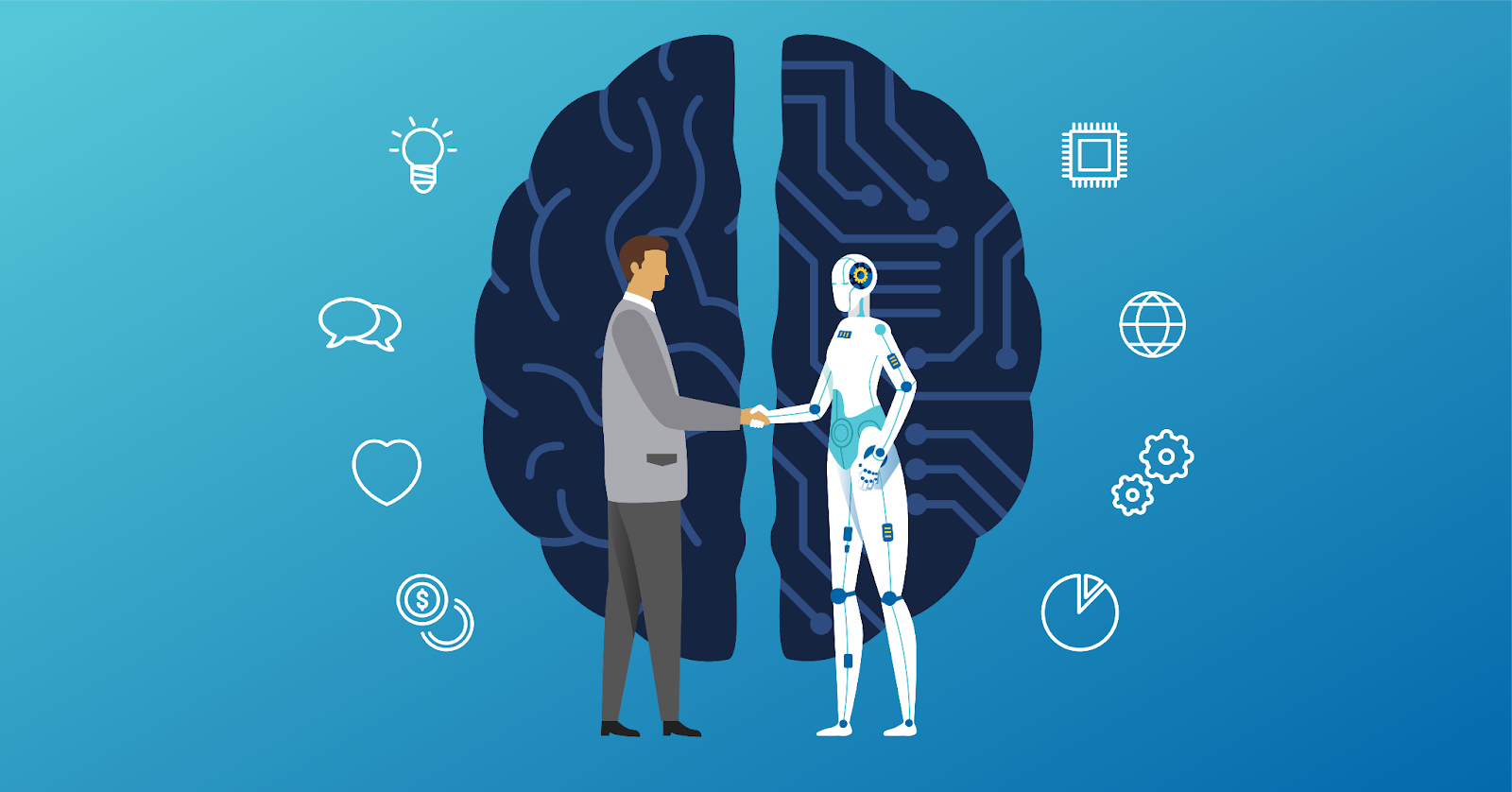
How AI Can Help In Procurement?
AI in procurement streamlines vendor selection, automates purchase order processing, and enhances spend analysis for smarter, data-driven decisions.
Key Technologies Integrated
These platforms bring together:
- Machine Learning (ML): Learns from historical data to improve decisions.
- Natural Language Processing (NLP): Understands and interprets human language for better communication and document handling.
- Robotic Process Automation (RPA): Automates repetitive procurement tasks.
- Advanced Analytics: Delivers insights from data to support strategic planning.
Functional Benefits
- Autonomous Decision-Making: Handles complex purchasing with little human input.
- Continuous Learning: Improves accuracy by analyzing historical procurement data.
- Process Optimization: Minimizes manual effort while increasing operational efficiency.
Up to 90% straight-through processing(STP) is possible for invoice matching with AI-powered 3-way match systems
Strategic Capabilities
These platforms track market trends and user behavior to refine procurement tactics, Predict future procurement needs & adapt to shifting business and regulatory requirements.
Core Components

- Intelligent Spend Analysis: Extracts and interprets spending data for better budgeting.
- Automated Supplier Discovery & Evaluation: Speeds up vendor identification and qualification.
- Contract Intelligence Systems: Streamlines contract creation, review, and compliance.
- Predictive Analytics Engines: Forecasts trends and informs strategic procurement decisions.
Why Organizations Should Focus on a Procurement Platform?
As organizations scale, managing purchases, renewals, and vendor contracts manually becomes inefficient and error-prone. A procurement platform centralizes these processes, helping teams save time, cut costs, and maintain control over spending. It streamlines collaboration between IT, finance, and procurement, ensuring transparency and compliance across every purchase.
Key reasons to invest in a procurement platform:
- Automation: Eliminate manual approval chains and speed up the procurement cycle.
- Cost Control: Track spend, prevent duplicate purchases, and optimize vendor contracts.
- Visibility: Get a single view of all purchases, renewals, and supplier performance.
- Compliance: Ensure all vendors meet security, legal, and audit requirements.
- Collaboration: Align IT, finance, and procurement teams with shared data and workflows.
A modern procurement platform, like CloudEagle.ai, goes beyond tracking spend — it helps organizations make smarter buying decisions, negotiate better deals, and maintain full lifecycle control over every SaaS purchase.
Top 10 AI Procurement Platforms in 2025
Explore the top 10 AI procurement platforms of 2025, transforming how enterprises optimize procurement and boost efficiency.
1. CloudEagle.ai
CloudEagle.ai is an advanced SaaS management and governance platform that leverages AI to optimize vendor spend and streamline procurement decisions. It automates the entire SaaS buying and renewal process with no-code workflows and customizable forms.
The platform provides usage insights, price benchmarking, and vendor research to help negotiate better deals, all while centralizing vendor and contract data for efficient license management and renewal tracking.
Key AI-driven features that make cloudeagle.ai stand out:
Customizable Intake & Approval Workflows
CloudEagle.ai makes procurement more efficient by automating the entire approval process. With customizable intake forms, it captures all the essential procurement details upfront, ensuring nothing is missed. Automated workflows route requests and approvals via Slack, email, or Teams, keeping requesters and stakeholders aligned throughout the entire process.
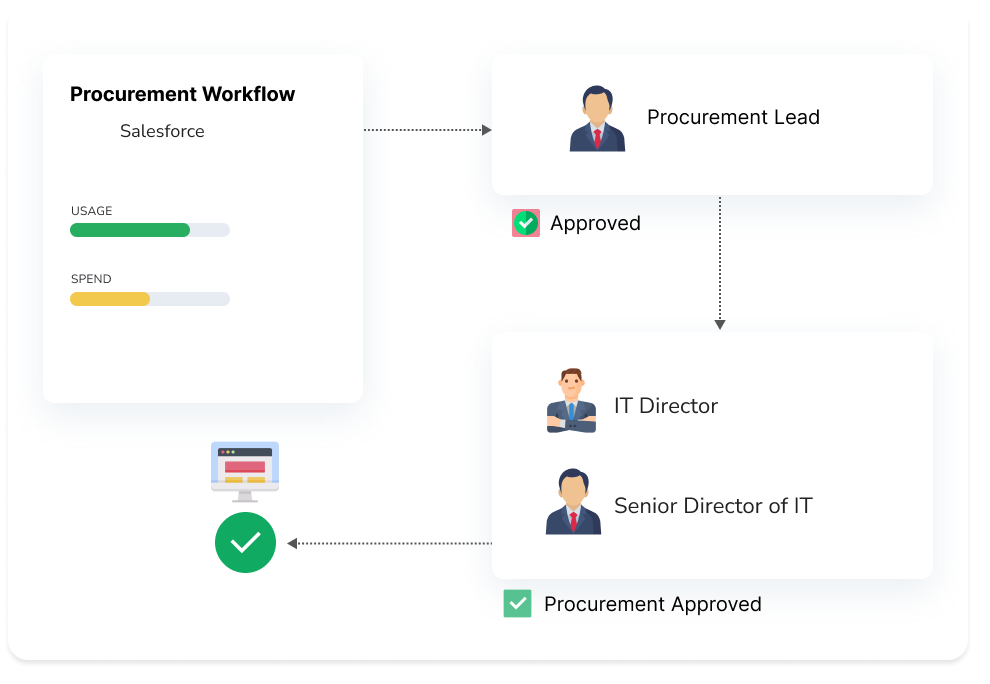
How It Helps:
- Reduces manual intervention and speeds up the procurement process.
- Ensures procurement tasks are completed on time with automated notifications.
- Increases efficiency by aligning teams with automated task management.
AI-Driven Vendor Discovery & Research
CloudEagle.ai simplifies vendor selection by leveraging AI to match your business needs with the best-fit vendors. The platform analyzes performance statistics, contract terms, peer reviews, and benchmarking data, allowing you to make data-backed decisions when choosing vendors.
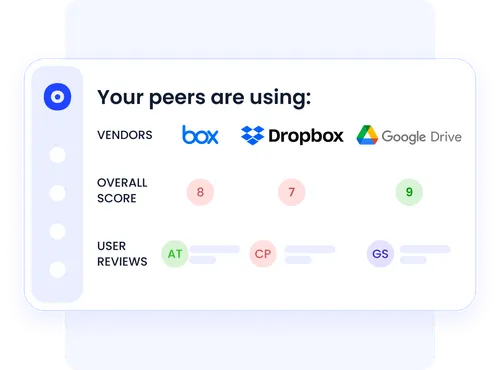
How It Helps:
- Helps businesses find the right SaaS vendors quickly.
- Eliminates the guesswork in vendor selection by using AI-powered recommendations.
- Provides detailed comparisons to help you select the best vendor for your needs.
Expert-Assisted Buying Options
CloudEagle.ai doesn’t just automate procurement; it also offers expert negotiation services. CloudEagle.ai’s team of procurement specialists works with you, using data-driven insights to negotiate better deals on your behalf. You can either manage the negotiations yourself with expert insights or let CloudEagle.ai handle everything for you.
How It Helps:
- Gives businesses access to expert procurement services without the need to build an in-house team.
- Leverages data-backed strategies to secure the best possible deal.
- Reduces the stress of vendor negotiations, allowing your team to focus on core tasks.
Price Benchmarking & Negotiation Support
With access to SaaSMap, CloudEagle.ai provides a comprehensive pricing database that analyzes over $15 billion in SaaS spend. This allows you to compare vendor pricing, so you can negotiate with confidence, ensuring you never overpay for software.
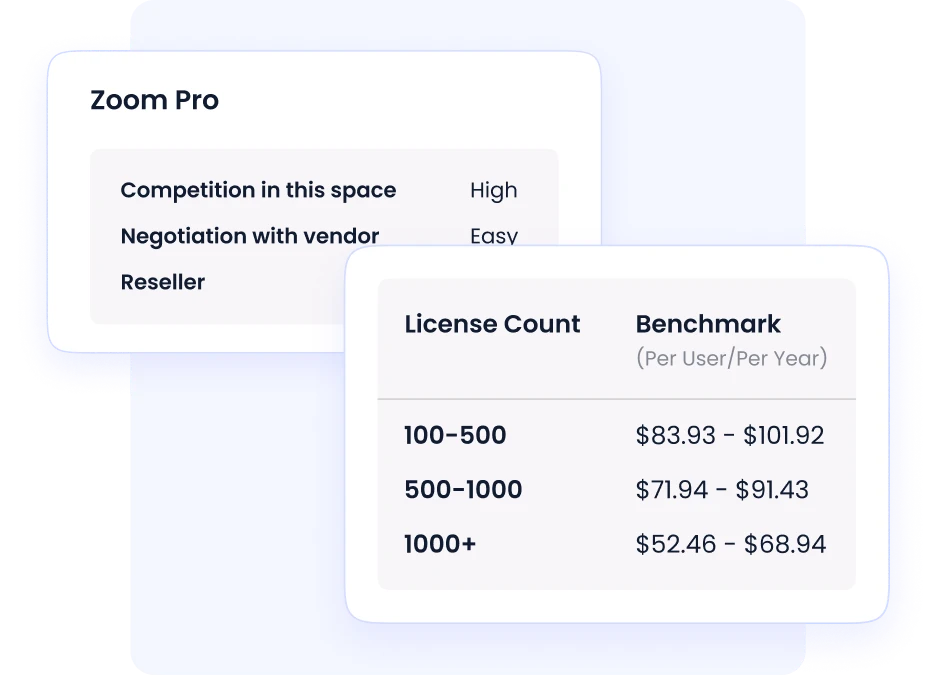
How It Helps:
- Gives you real-time industry pricing data to avoid overpaying for software.
- Helps you negotiate with confidence by providing data-driven insights.
- Supports cost reduction through accurate price comparisons and vendor negotiations.
Contract Metadata Extraction & Renewal Management
CloudEagle.ai automates the process of contract management, extracting key contract metadata such as renewal dates, billing cycles, and terms. By setting up reminders and workflows, the platform ensures you never miss a renewal deadline, keeping your contracts up to date without manual tracking.

How It Helps:
- Automates contract data extraction, reducing the risk of human error.
- Tracks and manages contract renewals proactively, avoiding last-minute rushes.
- Helps maintain compliance by keeping contracts and renewals organized in one place.
Centralized Vendor & Contract Dashboard
CloudEagle.ai consolidates all your vendor contracts, invoices, and SaaS usage in one unified dashboard. This central repository ensures complete visibility over your SaaS stack, including shadow IT, redundant apps, and underutilized licenses, improving governance and cost control.
How It Helps:
- Centralizes all vendor and contract data in a single view for easier management.
- Enhances visibility into app usage and vendor performance.
- Helps identify cost-saving opportunities by tracking underutilized licenses and redundant apps.
Seamless Tech Stack Integration
CloudEagle.ai integrates smoothly with your existing systems, including SSO, HRIS, ERP, and ITSM, offering secure, bi-directional synchronization. The platform’s low-code/no-code builder allows for rapid onboarding and easy customization without heavy change management.
How It Helps:
- Easily integrates with your existing tech stack to streamline workflows.
- Reduces integration time and complexity with low-code/no-code tools.
- Ensures seamless synchronization between various departments and systems.
2. ZipHQ
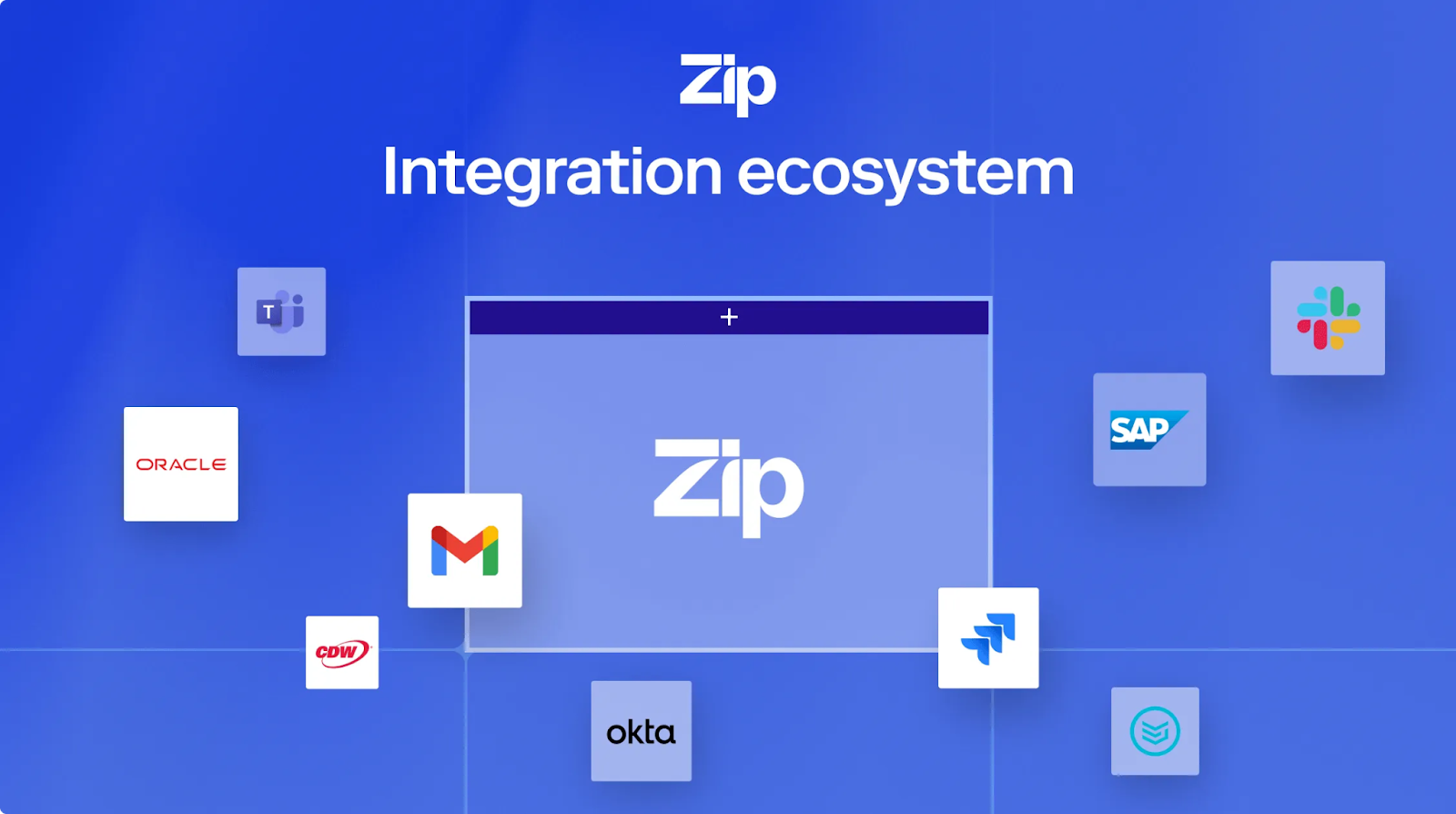
Zip HQ is a procurement automation platform that leverages AI to streamline approval workflows and purchase requisitions through intelligent routing systems.
Key Features
- Automated routing based on purchase value, category, and departmental rules
- Complete procurement management capabilities on mobile devices
Pros
- Reduces approval cycles from days to hours through intelligent automation
- Intuitive design that requires minimal training for adoption
Cons
- May lack advanced capabilities needed by large organizations
- Performance with high-volume transactions needs evaluation.
3. Ivalva

Ivalua is a comprehensive, enterprise-grade Source-to-Pay (S2P) platform with strong AI enhancements, supplier lifecycle management, and flexible deployment for complex procurement environments.
Key Features
- Generative AI across sourcing, supplier evaluation, contracts, and spend planning — with nine pre-built use cases.
- Advanced supplier risk, performance management, and compliance tools — plus real-time budget tracking and catalog support.
Pros
- Highly customizable and adaptable to complex processes and global compliance needs.
- Unified platform with strong ERP integrations, single data model, and consistent user interface.
Cons
- Steep learning curve; interface complexity and initial setup can be demanding.
- High cost and limited pricing transparency; often quote-based only after scoping
4. Procurify
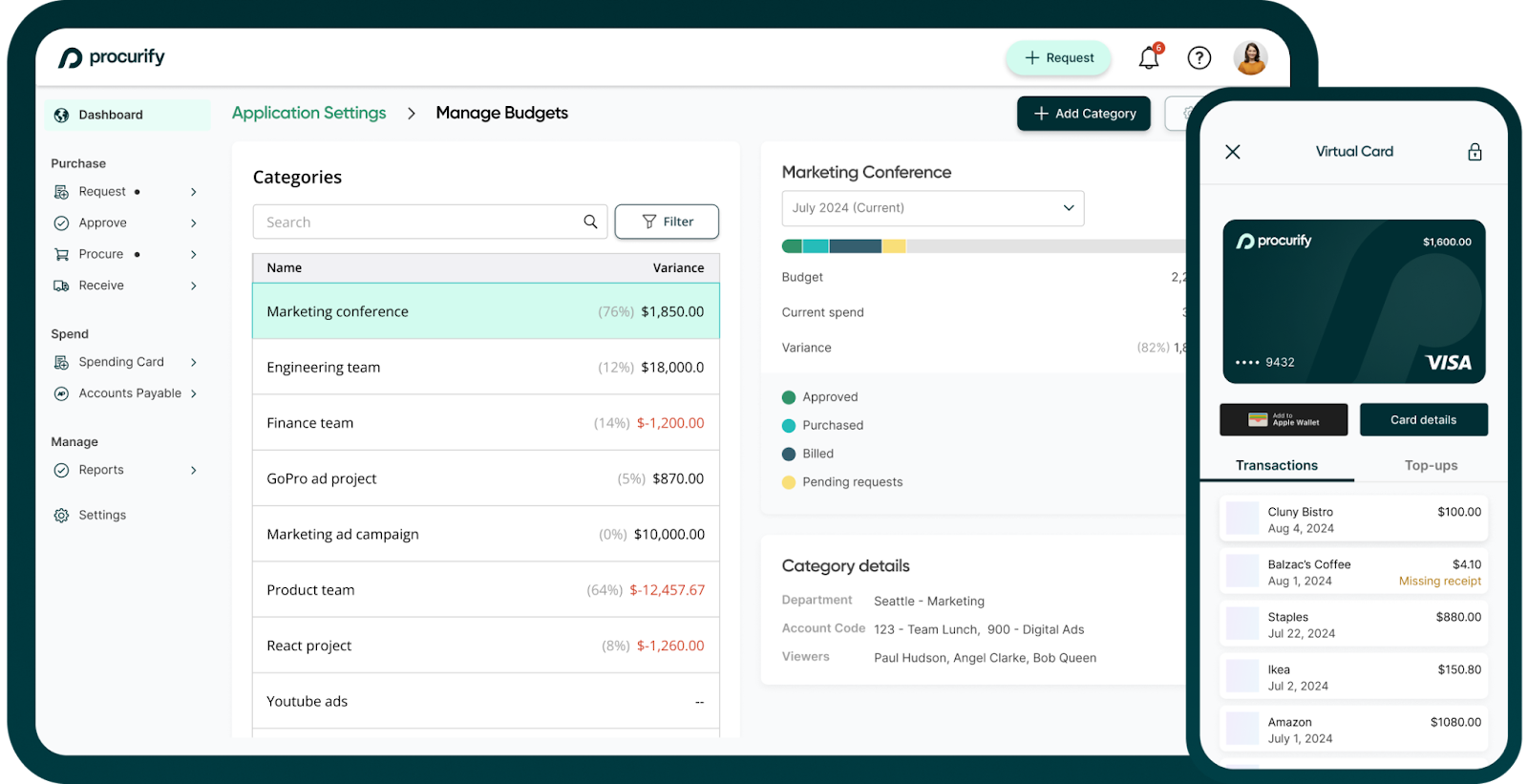
Procurify is a mid-market-focused AI procurement platform that streamlines SaaS purchasing with smart workflows, budget tracking, and collaborative vendor management.
Key Features
- Automated intake and approval workflows with smart routing.
- Real-time budget tracking and forecasting across departments.
Pros
- Intuitive UI that enables quick adoption without training.
- Faster procurement cycles with automation and templates.
Cons
- Lacks deep pricing benchmarks or negotiation services.
- No advanced license utilization or optimization tools.
5. JAGGAER
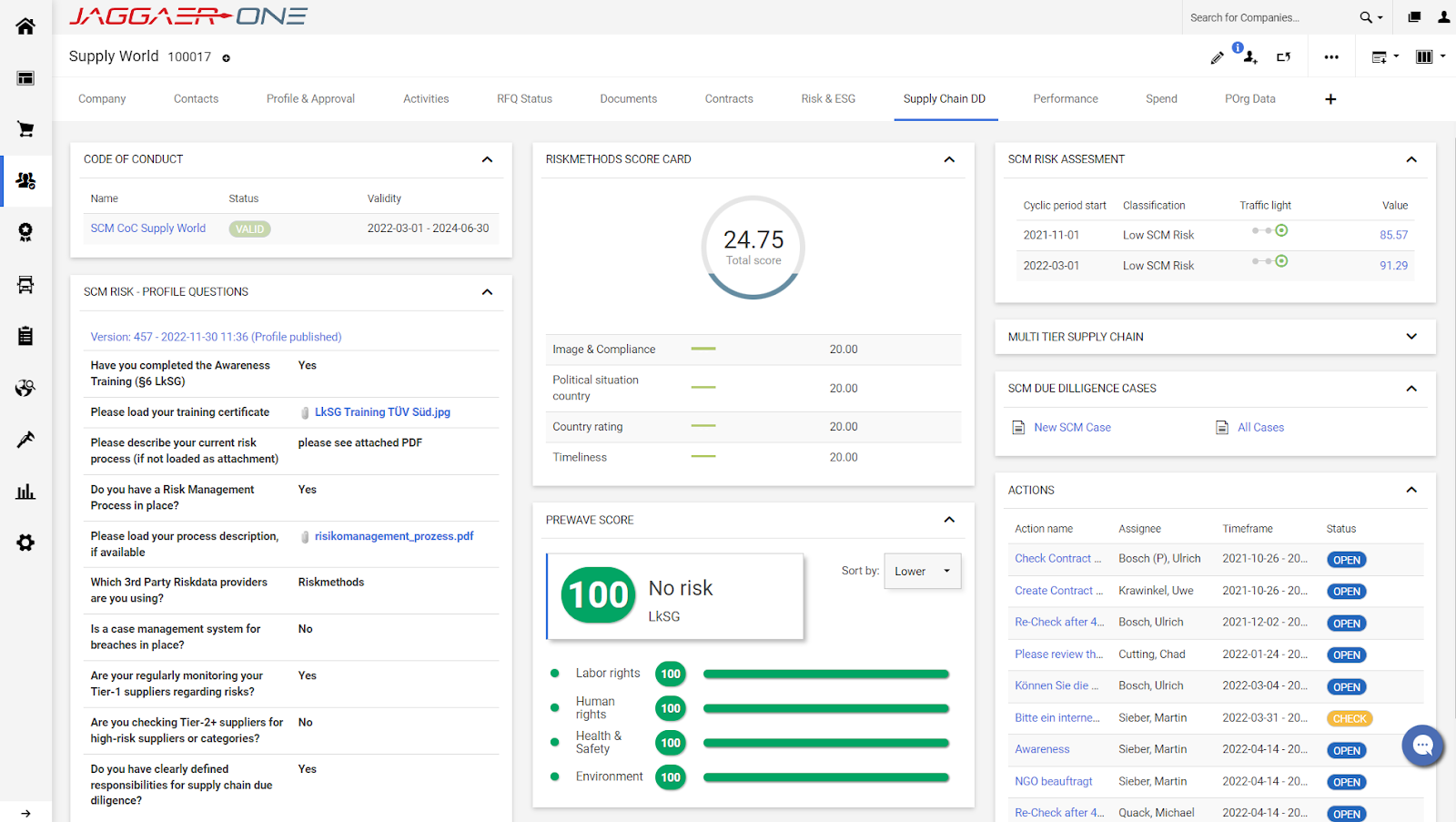
An enterprise-grade AI procurement platform designed for large organizations managing complex, compliance-heavy sourcing environments. Offers end-to-end coverage from sourcing to payment with advanced supplier and risk management tools.
Key Features
- Modular AI-driven tools for sourcing, contracting, and payment automation.
- Advanced supplier risk assessment and performance tracking capabilities.
Pros
- Designed for complex, highly regulated procurement ecosystems.
- Strong configurability with modular, scalable architecture.
Cons
- Requires significant implementation effort and technical onboarding.
- Higher TCO due to enterprise-grade licensing and service models.
6. GEP SMART
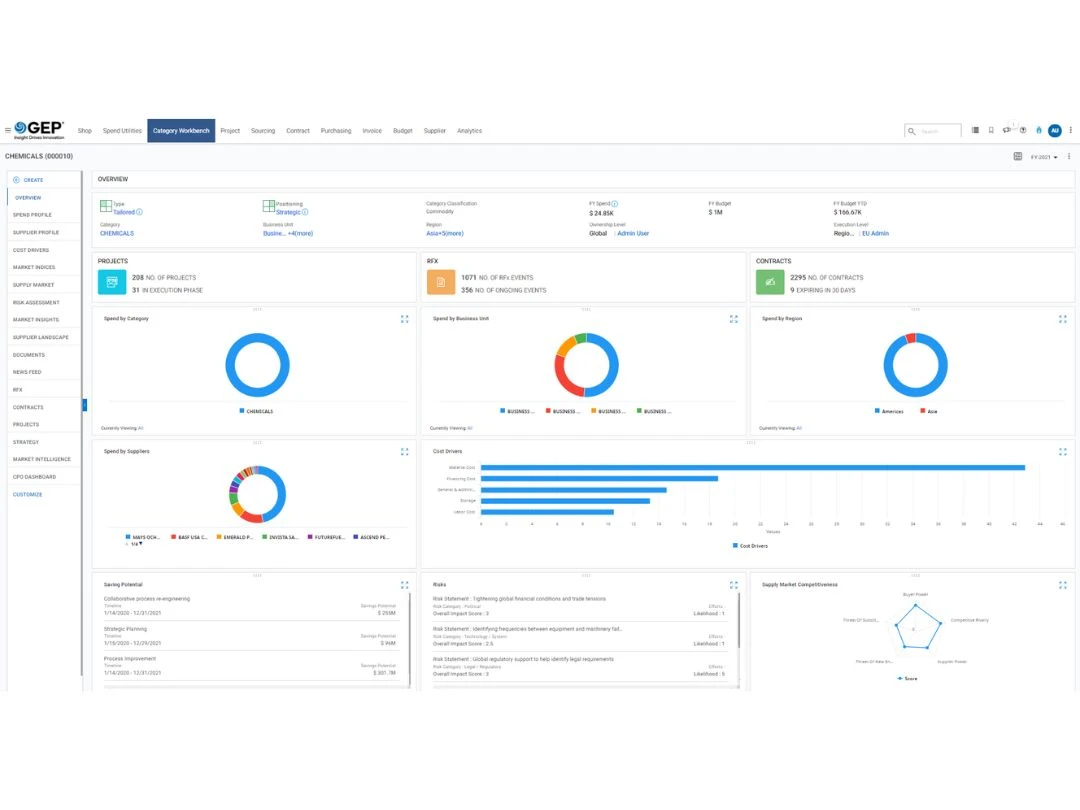
A unified AI-powered platform that combines procurement, supply chain, and vendor management to help large enterprises streamline sourcing, forecasting, and supplier performance.
Key Features
- AI-based sourcing optimization and supplier relationship management.
- Industry-specific modules with built-in procurement best practices.
Pros
- Unified solution covering procurement, contracts, and supply chain.
- Strong compliance and audit capabilities for regulated industries.
Cons
- Complex to configure and deploy across multi-entity enterprises.
- May lack procurement agility for fast-moving SaaS environments.
7. Keelvar
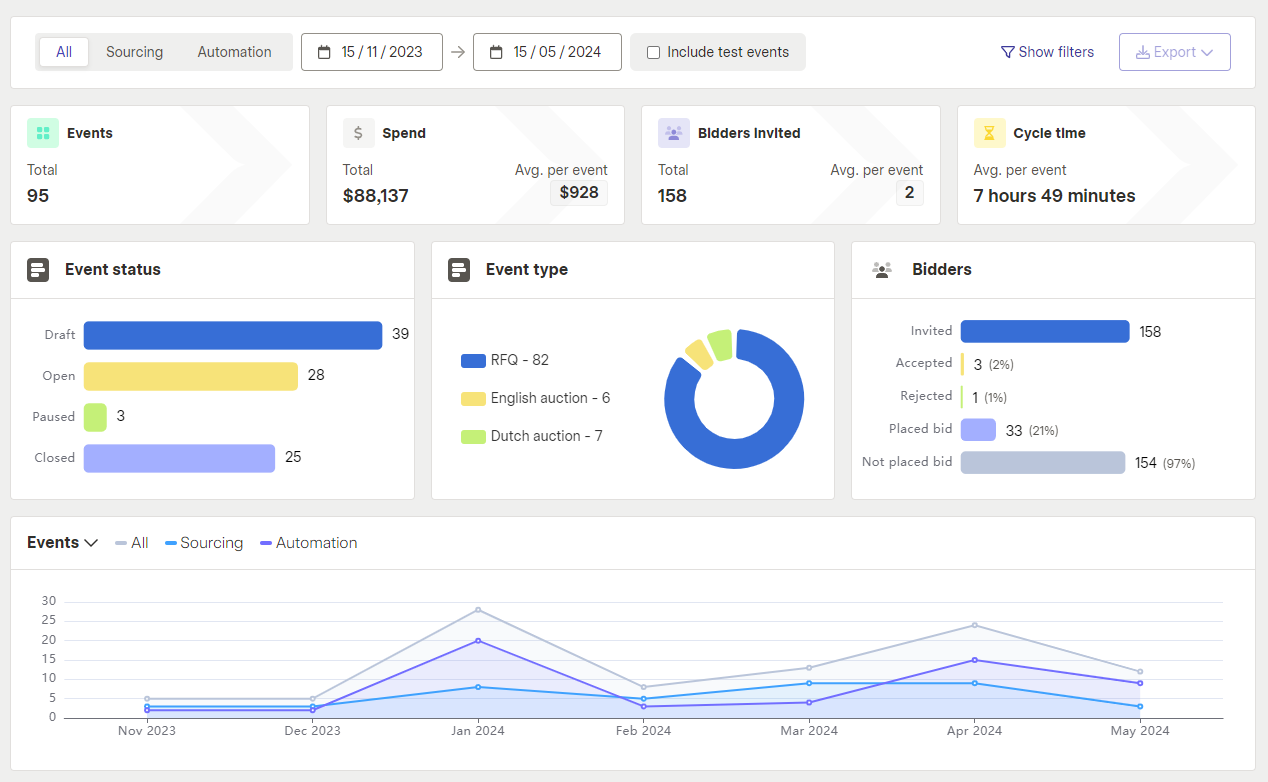
A purpose-built AI sourcing platform specializing in complex sourcing events, multi-attribute auctions, and real-time market intelligence. Ideal for enterprises looking to drive measurable cost savings through optimization.
Key Features
- AI-powered scenario modeling and sourcing decision support.
- Intelligent supplier selection with constraint-based recommendations.
Pros
- Excels in complex, multi-variable sourcing negotiations.
- Strong ROI through cost savings and supplier performance optimization.
Cons
- Limited beyond the sourcing function (no end-to-end procurement).
- May require expert users to fully utilize scenario modeling tools.
8. Zycus

A full-featured AI procurement platform covering spend planning, sourcing, contract lifecycle management, and vendor governance. Ideal for enterprises seeking end-to-end control with built-in compliance tools.
Key Features
- AI-powered supplier discovery and evaluation for smarter sourcing decisions
- Industry-specific templates and customizable workflows for rapid deployment
Pros
- Strong audit readiness through built-in compliance and risk controls
- End-to-end procurement coverage from planning to vendor governance
Cons
- Steeper learning curve due to system depth and customization options
- May involve lengthy implementation timelines for large deployments
9. Pactum
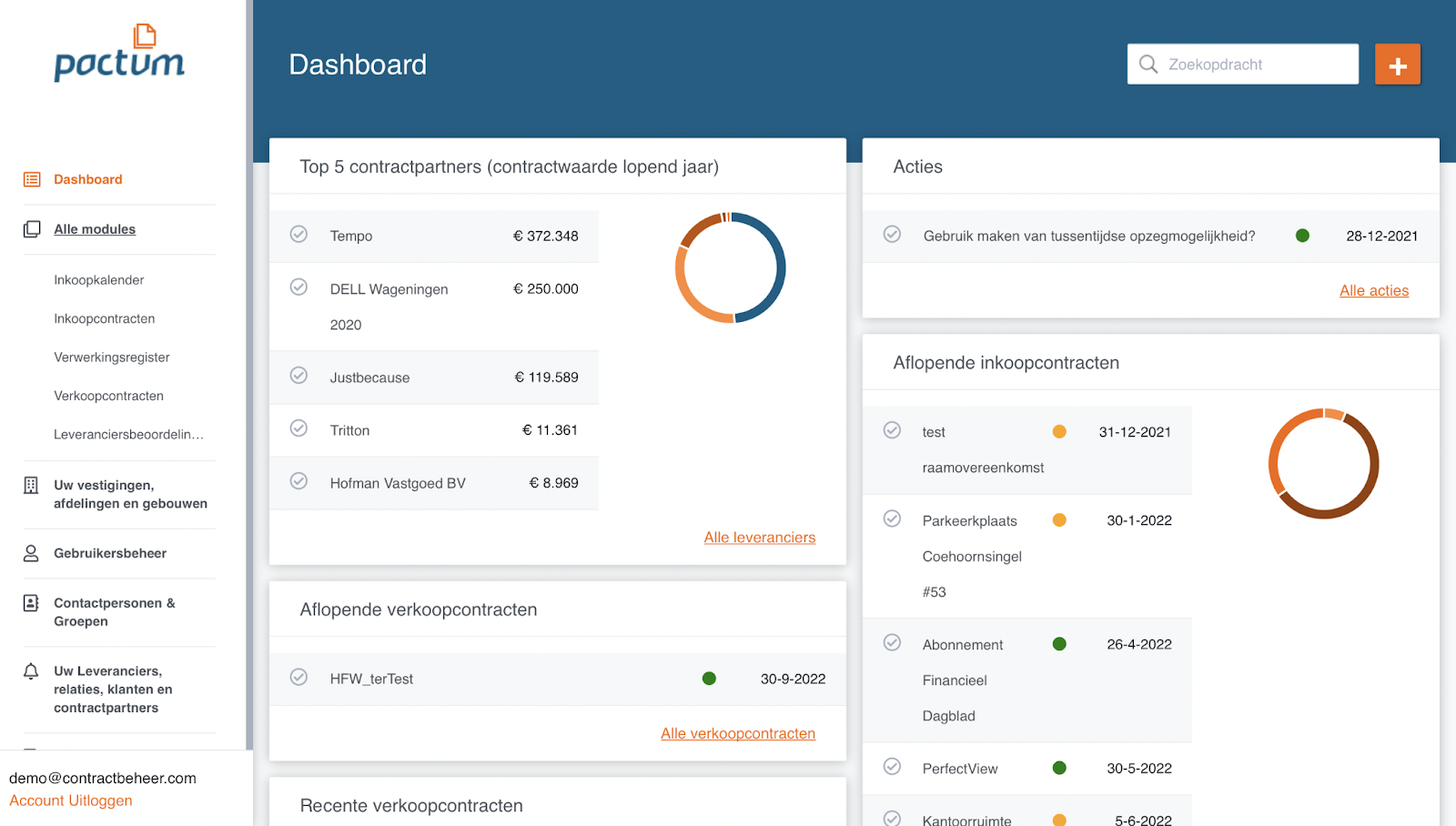
A specialized AI platform focused on automating supplier negotiations at scale. It leverages machine learning and historical data to improve outcomes, reduce cycle time, and ensure consistency across deals.
Key Features
- AI-driven contract negotiation and supplier communication automation.
- ML algorithms that evolve negotiation strategies based on past outcomes.
Pros
- Significantly reduces manual negotiation effort and turnaround time.
- Continuously improves outcomes through data-backed strategy learning.
Cons
- May require human oversight for complex or high-value deals.
- Limited sourcing or vendor discovery functionality.
10. Fairmarkit
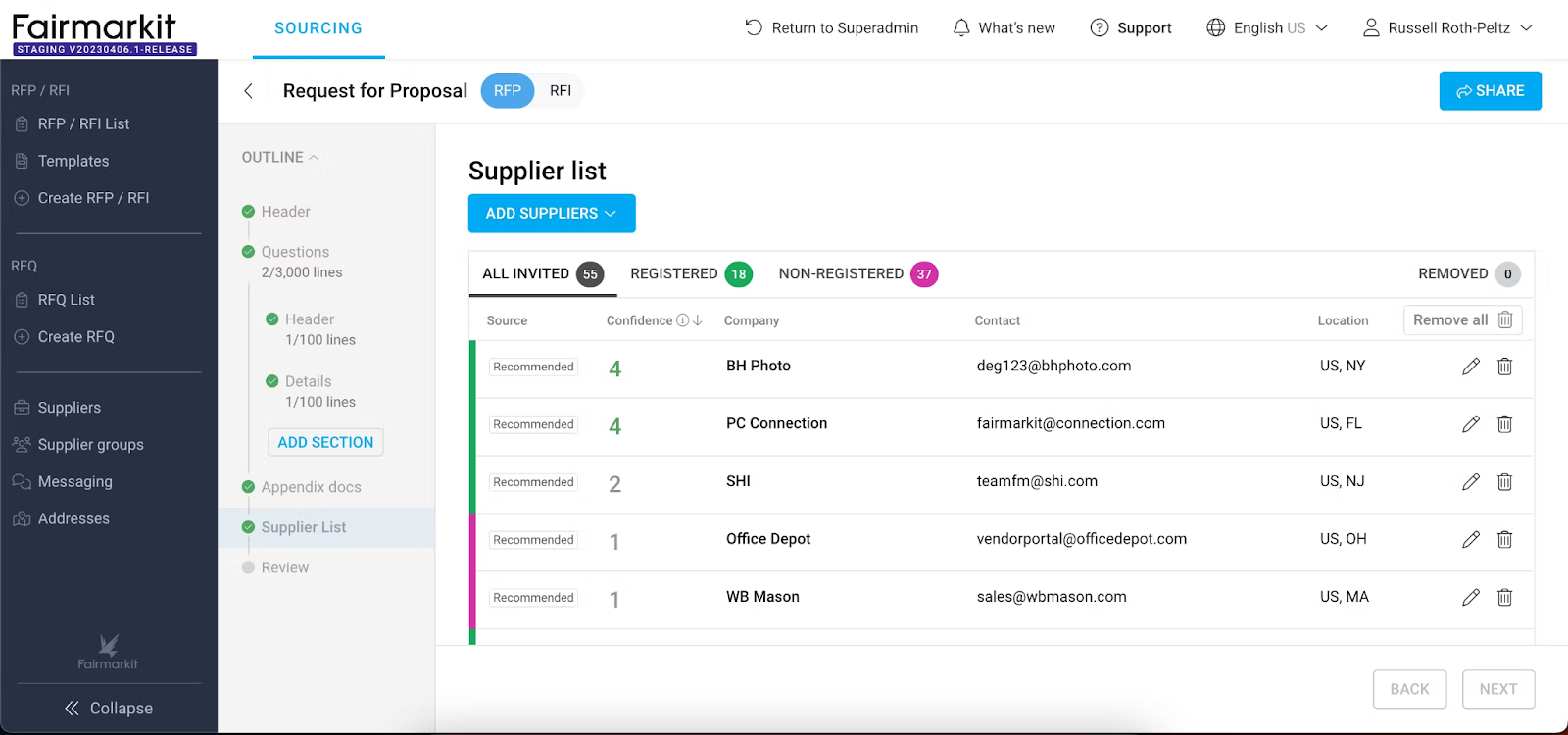
A purpose-built AI platform focused on managing tail spend, low-value, high-volume purchases often outside strategic sourcing. It automates supplier discovery, evaluation, and onboarding to increase efficiency and reduce maverick spend.
Key Features
- AI-powered supplier identification and cost-effective matching for non-strategic buys
- End-to-end automation of tail spend purchasing and supplier onboarding
Pros
- Eliminates manual overhead in long-tail purchasing processes
- Speeds up vendor enablement and contract execution
Cons
- Limited functionality for strategic or high-value sourcing initiatives
- Customization may be required to align with industry-specific needs
AI in Procurement: Overview and Impact
AI procurement software is transforming procurement by automating and optimizing sourcing, payments, risk management, and contracts. It replaces slow, manual tasks with fast, data-driven decisions.
- Finds the best suppliers and predicts award outcomes from market and supplier data.
- Automates request handling and invoice approvals, cutting cycle times by up to 70%.
- Monitors supplier risk for ESG, financial, and compliance issues in real time.
- Analyzes contract documents to spot risks and link performance to results.
- Delivers 5–12% extra savings and stronger compliance, with fewer delays and exceptions.
Adopting AI in procurement happens in three steps: digitize and automate basics, add predictive and intelligent features, then move toward self-managing processes.
- Pilot projects can include automating request intake, supplier screening, contract analysis, and accounts payable matching.
- Choose AI procurement solutions that integrate easily, allow human oversight, and offer clear explanations for decisions.
Why Enterprises Should Start Adopting AI Procurement Platforms?
In today’s fast-paced business environment, AI-driven procurement isn't optional; enterprises have to augment AI to avoid procurement mistakes. The traditional procurement process is often time-consuming, prone to human error, and cannot scale with growing demands.
According to a KPMG study, AI can help cut the time it takes to complete basic procurement tasks by up to 80%.
Here’s why enterprises should start integrating AI into their procurement strategies:
- AI automates repetitive tasks, freeing up procurement teams to focus on more strategic activities.
- AI can cut the time for basic procurement tasks by up to 80%, according to a 2023 KPMG study.
- AI platforms offer data-driven insights, enabling smarter and more informed purchasing decisions.
- By automating processes and improving accuracy, AI helps reduce procurement costs, leading to better financial management.
- AI-driven tools ensure adherence to company policies and regulations, minimizing procurement risks.
- AI platforms analyze supplier performance, helping enterprises choose the best suppliers for their needs.
AI Procurement Software That Focuses On What’s Truly Important
AI procurement software is designed to focus on what truly matters, such as streamlining processes, reducing risks, and driving cost savings. The right platform provides comprehensive visibility into applications, licenses, and spend, helping businesses detect inefficiencies while maintaining security and compliance.
Here’s what AI procurement software should prioritize:
- Risk Reduction: Automates deprovisioning, tracks audit trails, and sends vendor/contract alerts.
- Faster Cycle Times: Speeds up intake with policy routing and improves invoice processing.
- Savings Realization: Enables license harvesting, tool consolidation, and benchmarking for better renewals.
- Decision Clarity: Provides explainable insights with machine learning to guide decisions.
- Adoption at Scale: Features intuitive workflows for easy implementation and minimal change management.
How Is AI Used in Procurement Platforms?
1. Spend Classification & Optimization
AI procurement platforms automatically organize enterprise spend data. Instead of relying on manual tags or inconsistent categorizations, these systems use machine learning to assign spend categories with remarkable accuracy.
AI automation scans spend data across departments and systems. This uncovers:
- Redundant tools: Multiple teams paying for similar software or services.
- Underused licenses: Tools being paid for but not fully utilized.
- Duplicate payments: Accidental double billing or misfiled expenses.
- Overlapping contracts: Agreements with different vendors offering similar services.
These insights often get missed in manual audits, but AI catches them instantly.
Beyond detection, AI takes action. It suggests:
- Enterprise-wide licensing when different teams use similar tools, cutting per-unit costs.
- Preferred supplier programs that standardize vendors to boost volume-based discounts.
- Centralized renewals that prevent scattershot procurement and improve negotiation leverage.
These AI-driven strategies not only reduce waste, but they also enhance purchasing power and efficiency across the board.
2. Supplier Risk Analysis & Evaluation
- 24/7 Monitoring: AI continuously tracks supplier data without downtime or manual intervention.
- Diverse Data Sources: It pulls insights from financial reports, regulatory databases, watchdog organizations, and internal performance KPIs.
- Proactive Alerts: If supplier health or delivery metrics decline, AI flags issues early before disruptions occur.
- Advanced Risk Scoring: Evaluates risks based on compliance lapses, ESG rating drops, and ongoing performance trends.
- Dynamic Scorecards: Produce comprehensive supplier profiles that go beyond standard SLAs, offering a holistic view of vendor health.
3. Contract Intelligence
- Automated Contract Extraction: AI scans hundreds of agreements to capture key details like pricing terms, expiration dates, and penalty clauses, no manual effort needed.
- NLP-Based Risk Detection: Natural language processing flags problematic clauses, auto-renewal risks, and negotiation opportunities by interpreting complex legal language.
- Performance Alignment: AI links contract commitments like SLAs to actual vendor performance data, so if a supplier fails to deliver, you’ll catch it before renewal.
- Proactive Alerts: The system notifies procurement and legal teams of upcoming milestones or compliance gaps, enabling timely renegotiation or enforcement.
4. Predictive Analytics & Demand Forecasting
- Data-Informed Forecasting: AI analyzes historical purchasing data, seasonal patterns, and market signals to accurately predict demand.
- Proactive Inventory Management: Helps prevent overstocking or shortages by anticipating future needs based on recurring trends and external drivers.
- Early Alerts: Detects spikes in demand, such as SaaS renewals or raw material needs, well in advance, enabling timely action.
- Optimized Procurement Decisions: Recommends the right vendors, optimal purchase quantities, and ideal timing to place orders.
- Strategic Shift: Turns procurement from a reactive function into a proactive, synchronized engine that aligns tightly with business cycles and growth goals.
Conclusion
AI procurement platforms represent the future of strategic sourcing and vendor management. These intelligent systems deliver significant cost savings, efficiency improvements, and risk reduction. Organizations that adopt Generative AI in procurement software gain competitive advantages in their markets.
The ten platforms highlighted in this guide offer different strengths and capabilities. Each solution addresses specific procurement challenges and business requirements. The key is selecting a platform that aligns with organizational goals and technical requirements.
FAQ
1. Will AI Take Over Procurement?
AI won't replace procurement but will transform it. While AI excels at data processing and automation, humans remain essential for strategy, relationships, and complex negotiations. The future is human-AI collaboration.
2. How Can AI Help With Sourcing?
AI revolutionizes sourcing by intelligently discovering and evaluating suppliers from vast databases. It automates RFP processes, analyzes responses using natural language processing, and optimizes negotiations with market intelligence.
3. How Will AI Affect Procurement and Contract Management?
AI transforms contract management through automated analysis, compliance tracking, and risk identification. It extracts key terms, monitors milestones, and provides predictive analytics for better negotiations and outcomes.
4. What Are the Benefits of AI in Procurement?
AI delivers faster decision-making, cost savings through spend analysis, and reduced manual errors. It provides real-time market insights, automates repetitive tasks, and enables data-driven supplier selection for better procurement outcomes.
5. What Challenges Does AI Present in Procurement?
AI implementation requires significant data quality, staff training, and integration costs. Privacy concerns, algorithm bias, and over-reliance on automation pose risks. Organizations must balance efficiency gains with human oversight.

%201.svg)










.avif)




.avif)
.avif)




.png)
